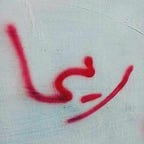The Mountain Palestinians Must Climb And The Ocean We Must Cross!
What happened to Palestine? How did a whole population vanish, for God’s sake, along with most of the country’s physical geography that continues to shrink before the world’s eyes today? Why is such a thing happening? Why did it ever happen?
It’s when we arrive at that “why” that our confusion and fury reaches a boiling point. The problem is exacerbated because no one really understands what manner of beast is Zionism — the short answer to “why?”. A friend expressed it to me this morning like this: “First we were told we had to distinguish between Jews and Zionists. We did and it didn’t get us anywhere. Are we now supposed to also distinguish between good and bad Zionists?”
Distinguishing between Jews and Zionists often appears to be an exercise in Orwellian rhetoric [as in 1984]. The second point Ronnie Barkan, a longtime Jewish Israeli activist and math teacher who was raised in Raanana, near Tel Aviv and is a co-founder of Boycott from Within, makes in his post addressing Peter Beinart’s self-serving awakening, is this (Barkan’s first point is an accusation that Beinart constantly conflates “criminal supremacist Zionism” with Judaism):
2. Israel is NOT a “Jewish state” — it is a Zionist state — a criminal race-state built from the grounds up to practice apartheid, ethnic cleansing and ethnic supremacy — all for the sake of the Zionist project in Palestine. [“Some 700 words in response to Peter Beinart’s 7000 words of Zionist propaganda.”]
Such distinctions create complications for Palestinians and Jews alike related to the widely accepted definition of the construct of the term “Jewish.” According to Hanna Arendt, “Jewish” is “cultural, historical and political as related to Jews who may or may not engage or explicitly identify with Judaism.”
Most anti-Zionists believe that Israel is Zionist but not Jewish: “If it is possible to be Jewish and not Zionist, why is it not possible for Israel to be Zionist and not Jewish?” My short answer to this is: Because Zionism, by definition, is Jewish nationalism.
If Peter Beinart’s Zionism isn’t Jewish, and the Zionist identity of the Jewish community he is addressing isn’t Jewish, then what is a Jewish nationalist?
Another friend, also commenting on Beinart’s essay, says: “I realise this can all look pathetically self-serving, especially to Palestinians. I can see the Jewish context he is working in and he’s asking his audience to climb a mountain and cross an ocean.”
The Jewish context often appears to us Palestinians to mean that “criminal supremacist Zionism” (to use Barkan’s phrase again) cannot possibly be applied to Jews. For example, a Mondoweiss headline states: “Liberal Zionists echo white nationalists.” True! But don’t Jewish nationalists also echo white nationalists? It is only when the idea of Jewish nationalism is dead that an Israeli nationality (and from there one Palestinian/Israeli nationality — i.e. one state) could be born.
When I asked a Jewish friend to help me understand this dynamic in the discourse on Palestine, here is what she said:
Because, due to the “narrative propaganda” Jews are always the victims of persecution, it was and is considered to be ‘antisemitic’ to blame any Jewish group for anything, because “it can lead to a new Holocaust”. Ronnie’s [Barkan] correct comparison of Zionists to KKK will be met with a “holy outrage”, because “how can Jews be supremacists when they are a persecuted minority”. Such is this persistent myth of Jewish victimhood.
So, this is what Palestinians are up against, the mountain we must climb and the ocean we must cross.
Zionism — i.e., Jewish nationalism — is Palestine’s Nakba. In Parting Ways: Jewishness and the Critique of Zionism, Judith Butler takes issue with Arendt’s understanding of “Jewishness”, stating:
There is no one definition and cannot be. Her view would be sufficient if it did not carry with it the presumption of European origin and affinity: this quality “Jewishness,” tends not to include the Mizrachim, whose cultural origins are Arab … Is it ever fully possible to extricate Jewishness from its religious background, or is its secular form one result or effect of a certain religious history? Or is it endemic to the religious — the Jewish, in this case — to be constantly departing from its religious history?
Butler goes on to say that she poses these questions without knowing the answers. As for us, Palestinians, in the words of yet another friend, “Our perception of anti-Zionism is what it is because its consequences are materializing in Palestine. Otherwise, we probably wouldn’t care as much about Jewish nationalism, politically or ideologically.”
In the New York Times interview from which the image above is captured, we come across the following passage:
Asked if he [Ben-Gurion] feared for his country, he replied, “Oh, I always feared. I always. Not just now.” Though it was 20 years after Israel’s founding, he said that he feared “the state does not yet exist. It’s a beginning only.”
In their beginning is our end.
___________________
Rima Najjar is a Palestinian whose father’s side of the family comes from the forcibly depopulated village of Lifta on the western outskirts of Jerusalem and whose mother’s side of the family is from Ijzim, south of Haifa. She is an activist, researcher and retired professor of English literature, Al-Quds University, occupied West Bank
